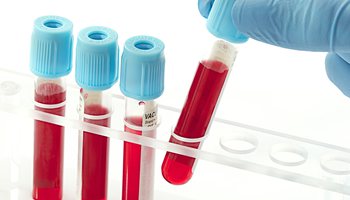


Xinhua photo
U.S. researchers said Wednesday that they have developed a new test that identified more than half of 138 people with relatively early-stage colorectal, breast, lung and ovarian cancers by detecting tiny amounts of DNA circulating in the blood that originate from tumors.
"This study shows that identifying cancer early using DNA changes in the blood is feasible and that our high accuracy sequencing method is a promising approach to achieve this goal," said Victor Velculescu, professor of oncology at the Johns Hopkins Kimmel Cancer Center, whose study was published in the U.S. journal Science Translational Medicine.
Blood tests for cancer are a growing part of clinical oncology, but they remain in the early stages of development.
To find small bits of cancer-derived DNA in the blood of cancer patients, scientists have frequently relied on DNA alterations found in patients' biopsied tumor samples as guideposts for the genetic mistakes they should be looking for among the masses of DNA circulating in those patients' blood samples.
The challenge is that the test should distinguish between DNA shed from tumors and other altered DNA that can be mistaken for cancer biomarkers.
Most of the time, the blood-derived mutations are not cancer-initiating, and "false positive" results often lead to unnecessary overtesting and overtreatments.
To develop the new test, Velculescu and colleagues obtained blood samples from 200 patients with breast, lung, ovarian and colorectal cancer.
The scientists' blood test screened the patients' blood samples for mutations within 58 genes widely linked to various cancers.
Overall, the scientists were able to detect 86 of 138 stage I and II cancers.
The team also performed independent genomic sequencing on available tumors removed from 100 of the patients and found that 82 had mutations in their tumors that correlated with the genetic alterations found in the blood.
They also tested blood samples of 44 healthy individuals and did not find any cancer-derived mutations.
Despite these initial promising results for early detection, the blood test needs to be validated in studies of much larger numbers of people, said the scientists.
The new blood test is based on deep sequencing, which reads each chemical code in DNA 30,000 times. It's very costly but Velculescu stressed that sequencing technology is becoming cheaper.
He predicted that people that could benefit most from such a DNA-based blood test include those at high risk for cancer including smokers -- for whom standard computed tomography scans for identifying lung cancer often lead to false positives -- and women with hereditary mutations for breast and ovarian cancer within BRCA1 and BRCA2 genes.
 Fire brigade in Shanghai holds group wedding
Fire brigade in Shanghai holds group wedding Tourists enjoy ice sculptures in Datan Town, north China
Tourists enjoy ice sculptures in Datan Town, north China Sunset scenery of Dayan Pagoda in Xi'an
Sunset scenery of Dayan Pagoda in Xi'an Tourists have fun at scenic spot in Nanlong Town, NW China
Tourists have fun at scenic spot in Nanlong Town, NW China Harbin attracts tourists by making best use of ice in winter
Harbin attracts tourists by making best use of ice in winter In pics: FIS Alpine Ski Women's World Cup Slalom
In pics: FIS Alpine Ski Women's World Cup Slalom Black-necked cranes rest at reservoir in Lhunzhub County, Lhasa
Black-necked cranes rest at reservoir in Lhunzhub County, Lhasa China's FAST telescope will be available to foreign scientists in April
China's FAST telescope will be available to foreign scientists in April "She power" plays indispensable role in poverty alleviation
"She power" plays indispensable role in poverty alleviation Top 10 world news events of People's Daily in 2020
Top 10 world news events of People's Daily in 2020 Top 10 China news events of People's Daily in 2020
Top 10 China news events of People's Daily in 2020 Top 10 media buzzwords of 2020
Top 10 media buzzwords of 2020 Year-ender:10 major tourism stories of 2020
Year-ender:10 major tourism stories of 2020 No interference in Venezuelan issues
No interference in Venezuelan issues
 Biz prepares for trade spat
Biz prepares for trade spat
 Broadcasting Continent
Broadcasting Continent Australia wins Chinese CEOs as US loses
Australia wins Chinese CEOs as US loses